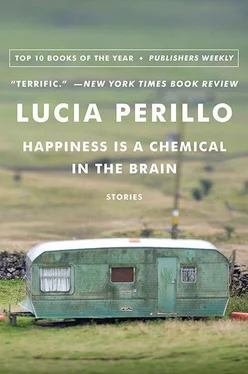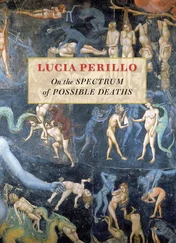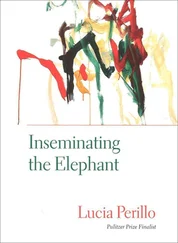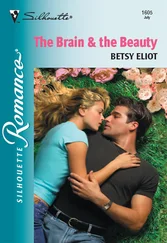“Well, I take comfort in surroundings for which I feel a touch of loathing,” she snapped. “That’s the British in me. Why do you think England has so bloody many chip shops?”
For his part, my father weighed in later that evening via the telephone, his version coming down to the bottom line that I could count on his pressing charges. “Your mother’s not exempt from the rule of law,” he said, “just because she’s got a broken heart.” All I’ve got to say to him is that he shouldn’t flatter himself about my mother’s heart.
And maybe it was Louisa’s account that was the most unbiased, Louisa who was plied with quarters and taken downstairs to the vending machines. A lady policeman showed her how the handcuffs worked. “Then I was locked in jail with Mummy,” she said, her terror having given way to exhilaration over her ordeal.
We were back in the kitchen, eating from a Styrofoam container of moo goo gai pan that I found in the glove box, my mother having retreated upstairs. Louisa’s voice takes on a conspiratorial tone when she tells me, “Mummy got locked up for a bad word.”
Which? I ask, but here my sister clams up.
“Come on,” I say. “Was it the F ?”
A sideways shake from Louisa’s head.
“ S-h? A-hole?” and now she starts giggling.
“Was it, you know, something British? Did she call the cops wankers?”
Louisa’s dying, fit to burst.
“Dildo, dickhead? Douchebag? Dork?”
“No — it was the C !” she squeals, the baddest of the bad words because it is the female one. And this recounting of my mother’s naughtiness has made my sister drunk with remembering her minor part in it. She can hardly contain herself when she reports, “That’s what Mum called the lady.”
“Which lady?”
“The one sitting in his car. The one who Mummy says has ruined everything!”

THAT’S HOW OUR TIME on the gulag came to an end, because property values had gone haywire and we knew he would go after whatever he could get. My mother would end up she knew not where yet with Louisa, and I would get another moldy duplex for myself in town, whose other half would be occupied by a pair of teenage newlyweds, whose common wall would thump whenever he tied one on and sent her reeling against it. Of course, I was only projecting at this point, extrapolating from the data of the past, which I wasn’t supposed to do now that I’d been rehabbed. Roger said that I should see my life as a ball of clay that could be molded into anything.
“But say I left the clay in my purse in the car, and say with the windows rolled up the whole thing got sort of baked and cracked so that when I go to take the clay out of my purse it crumbles?” Somehow we’d wound up back at the clay metaphor for about the thousandth time, and when I mention this scenario all the other narcos go: “Yeah! Yeah! What about when that happens?”
Roger rolls his eyes before letting them wander back to me.
“Well,” he says, “an addict can make up all manner of excuses.”
“You’re saying there’s no such thing as an accident?”
“All I’m saying is that adults take responsibility for their actions.”
He’s tapping his clipboard with his pen like he wants to move on, but I won’t let him. “But Roger,” I say, “think about it. All I’ve got are some dry clay crumbs. What the hell am I supposed to do with that?” He’s giving me his thin smile, a signal that he’s about to go into his default mode, which is whimsy.
“Maybe you have to use your imagination,” he says.
“Like how?”
“That’s up to you,” he says without uncurling his lips. “Perhaps you could use the crumbs to make an hourglass.”

OKAY: JUST TRY telling this to someone like my mother — her life is clay, she can be anything, when the clay dries up she’s supposed to put the crumbs inside an hourglass — when in fact her doofus of a public defender has already convinced her that she can be only one thing and that is Crazy, especially if she doesn’t want to pull some serious time in the big house. He also told her that, since Louisa would likely be deemed an unreliable witness, I was the one who ought to carry the flag on her behalf. I guess I should have been flattered, since reliable is not a word that’s been applied to me much of late, maybe not since the old days when I was my father’s stable girl. Whenever the question was, “Did you remember to brush out Mister Chester?” I was perfectly consistent, I could always answer yes.
But to my surprise he did not appear; instead it was just me and Louisa and Mum and her lawyer, who wore desert boots and a plaid short-sleeved shirt with one of those lumpy wool ties squared off at the tip. They held the competency hearing in the modular building outside city hall, in a drop-ceilinged room completely lined with mustard-colored indoor-outdoor carpet, which was where I got up and told the judge about how my mother’d taken to leaving food in the glove box, about how she stood there muttering to herself when she first shot the gun, and to make it a stronger scrap for the story I had her babbling a mix of William Blake and Edgar Cayce. Plus I put her in her nightgown when she lies down in the poppies and will not get up. After all, how much difference is there between a nightgown and a raincoat? I mean, is God really keeping that close a tab on the nomenclature himself?
So it was a victory, of sorts, when the judge ruled that my mother would just spend two weeks in the loony bin — at the end of which time he’d leave it to the doctors’ recommendations. “Piece of cake,” I told her. “You’ll get out with more pot holders than you’ll know what to do with.” The psych ward at Saint Jude’s is in a different building from the rehab unit, but sometimes our nurses would stop by the psych ward to borrow supplies for arts and crafts. They were afraid to let the populations mix for fear the narcos would start hitting up the psychos for their meds.
All this I’m explaining in my mother’s bedroom as she packs her pink suitcase from the sixties with the plastic wood-grain trim. She wanted me to advise her about what she should wear to be a crackpot, and I said that was the beauty of being one: at last, you get to wear whatever you want.
Late that afternoon my mother comes downstairs with the suitcase, the shoes she’s selected pinched between the fingers of her free hand. They’re her good heels — she must have decided to go Classy Crackpot — and I can tell that she’s making a performance of her leaving, which is, after all, just a rehearsal for the more permanent leaving that will come later, when my father cuts her loose without a cent. Already he’s told me that after my mother leaves he’ll send a trailer down for Mister Chester, whom he plans to board at a stable near his new house overlooking the Puget Sound.
“I guess it’s time for one last perambulation,” my mother says, after setting both suitcase and shoes beside the door. Through the picture window, I watch her feet slide into her boots on the steps and walk toward the barn, which is in truth little more than a shed, a cockeyed structure whose rotting silvery frame contains just enough room for Mister Chester and the winter’s stockpile of hay. My mother goes in and leaves the doors open, and soon Mister Chester comes walking out; when she comes out after him she’s once again got the Browning in her grip. She must have found it where I had it stashed between the hay bales, and for a minute when she hoists the gun I think she means to kill. Okay, I will let her have him , is what I say then to myself, because in nobody’s mind but my own was Mister Chester ever anything other than my father’s horse. As my mother has pointed out, all those years I was gone, living in town, what good was I? What good was I?
Читать дальше













